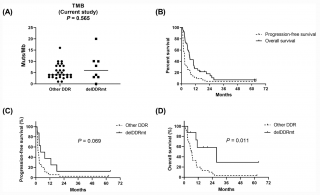Oct, 2022

Although DNA damage response and repair (DDR) gene alteration has been demonstrated as a biomarker for anti-PD-1 therapy in several cancer types, its role in esophageal squamous cell carcinoma (ESCC) is unknown. Patients with advanced ESCC treated with anti-PD-1-based immunotherapy were enrolled. Tumor response was evaluated according to RECIST 1.1. Archival ESCC tissues were analyzed using FoundationOne CDx. Deleterious alterations, defined by loss of function, of DDR genes were correlated with patient survival by Cox proportional hazards model. The prognostic significance of deleterious alterations of DDR genes in The Cancer Genome Atlas (TCGA)-ESCC cohort was explored. Forty-three patients were enrolled. The objective response rate (ORR) was 19%. The median tumor mutational burden was 4 mutations/Mb (0-20); none of the tumors were microsatellite instable. Compared with patients with wild-type or other alterations of DDR genes (N = 35, 81%), those with deleterious alterations of DDR genes (N = 8, 19%) had a higher ORR (38 vs. 14%), longer median progression-free survival (4.1 vs. 2.0 months), and significantly longer median overall survival (OS; 27.7 vs. 6.1 months, P = 0.011). In multivariate analysis, harboring deleterious alterations of DDR genes was a favorable prognostic factor for OS (HR = 0.31 [95% CI: 0.11-0.91], P = 0.033). In the TCGA-ESCC cohort, the presence of deleterious alterations of DDR genes was not a favorable prognostic factor. Deleterious alterations of DDR genes may be associated with improved prognosis and efficacy of anti-PD-1 therapy in patients with advanced ESCC.